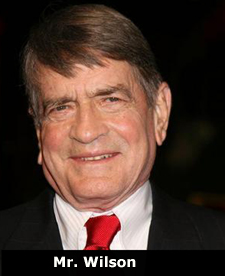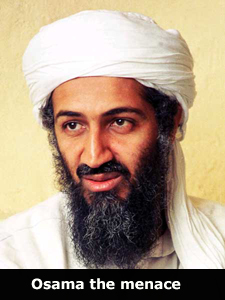Wilson's menace.
News organizations, film-makers, and journalists in general have a maddening tendency to personalize everything and render the most complex issues into extended personal anecdotes. It's a method for storytelling tried and true, and it's obviously one that generates sales since it is so prevalent in the  mainstream media. This sometimes manifests itself in the form of stories that focus on a reporter's experience rather than whatever that reporter is witnessing. (Gary Trudeau has offered an extreme example of this with his journalist character Roland Hedley and his perpetually inane Twitter feed.) There's also the phenomenon of framing complex historical events as being largely the product of one person's efforts. Probably the best example of this would be Reagan purportedly bringing down the Berlin Wall through the awesome power of speech. And there's "Charlie Wilson's War", the namesake of which - former Texas representative Charlie Wilson - just passed away this week.
mainstream media. This sometimes manifests itself in the form of stories that focus on a reporter's experience rather than whatever that reporter is witnessing. (Gary Trudeau has offered an extreme example of this with his journalist character Roland Hedley and his perpetually inane Twitter feed.) There's also the phenomenon of framing complex historical events as being largely the product of one person's efforts. Probably the best example of this would be Reagan purportedly bringing down the Berlin Wall through the awesome power of speech. And there's "Charlie Wilson's War", the namesake of which - former Texas representative Charlie Wilson - just passed away this week.
This is nothing new. I suppose it just irked me when I heard a story about Wilson on NPR's Morning Edition this week. And though it's appropriate that they would do some kind of memorial of the guy, it just seems bizarre that, in the context of all that is happening in Afghanistan right now, they would be talking about the long pre-history of the current conflict with the guy who played Wilson in a movie (Tom Hanks). It's possible that NPR has plumbed the depths of our involvement in Afghanistan on other occasions, but I certainly haven't heard them do it, and I listen quite a bit. Not as easy a story to tell, for sure, but probably well worth the broadcast time. No offense to the relatives of Mr. Wilson, but listeners would be better served to hear about that than about the late Congressman's exploits with Russian supermodels.
 Whatever his role may have been in providing fuel to the Afghan war effort during the 1980s, this was not the work of one man, any more than the fall of the Berlin Wall was the result of one speech. This ongoing crisis was many, many years in the making, beginning in earnest with the Carter administration and the decision to begin backing the fundamentalist factions within Afghanistan because it was felt that they would prove a longer-term, more pernicious problem for the Soviets than any secularist elements. Money began flowing on a larger scale in the Reagan years as the CIA embarked on what was up to that time the largest operation in their history, conducted in cooperation with the Pakistani ISI and the Saudis. Fanatical fighters were recruited all over the Muslim world, including most notably Osama bin Laden and his cohorts. So we all had a piece of this one, and now it's got a piece of us.
Whatever his role may have been in providing fuel to the Afghan war effort during the 1980s, this was not the work of one man, any more than the fall of the Berlin Wall was the result of one speech. This ongoing crisis was many, many years in the making, beginning in earnest with the Carter administration and the decision to begin backing the fundamentalist factions within Afghanistan because it was felt that they would prove a longer-term, more pernicious problem for the Soviets than any secularist elements. Money began flowing on a larger scale in the Reagan years as the CIA embarked on what was up to that time the largest operation in their history, conducted in cooperation with the Pakistani ISI and the Saudis. Fanatical fighters were recruited all over the Muslim world, including most notably Osama bin Laden and his cohorts. So we all had a piece of this one, and now it's got a piece of us.
Like most wars, this is a lot bigger than any biopic.
luv u,
jp
 mainstream media. This sometimes manifests itself in the form of stories that focus on a reporter's experience rather than whatever that reporter is witnessing. (Gary Trudeau has offered an extreme example of this with his journalist character Roland Hedley and his perpetually inane Twitter feed.) There's also the phenomenon of framing complex historical events as being largely the product of one person's efforts. Probably the best example of this would be Reagan purportedly bringing down the Berlin Wall through the awesome power of speech. And there's "Charlie Wilson's War", the namesake of which - former Texas representative Charlie Wilson - just passed away this week.
mainstream media. This sometimes manifests itself in the form of stories that focus on a reporter's experience rather than whatever that reporter is witnessing. (Gary Trudeau has offered an extreme example of this with his journalist character Roland Hedley and his perpetually inane Twitter feed.) There's also the phenomenon of framing complex historical events as being largely the product of one person's efforts. Probably the best example of this would be Reagan purportedly bringing down the Berlin Wall through the awesome power of speech. And there's "Charlie Wilson's War", the namesake of which - former Texas representative Charlie Wilson - just passed away this week.This is nothing new. I suppose it just irked me when I heard a story about Wilson on NPR's Morning Edition this week. And though it's appropriate that they would do some kind of memorial of the guy, it just seems bizarre that, in the context of all that is happening in Afghanistan right now, they would be talking about the long pre-history of the current conflict with the guy who played Wilson in a movie (Tom Hanks). It's possible that NPR has plumbed the depths of our involvement in Afghanistan on other occasions, but I certainly haven't heard them do it, and I listen quite a bit. Not as easy a story to tell, for sure, but probably well worth the broadcast time. No offense to the relatives of Mr. Wilson, but listeners would be better served to hear about that than about the late Congressman's exploits with Russian supermodels.
 Whatever his role may have been in providing fuel to the Afghan war effort during the 1980s, this was not the work of one man, any more than the fall of the Berlin Wall was the result of one speech. This ongoing crisis was many, many years in the making, beginning in earnest with the Carter administration and the decision to begin backing the fundamentalist factions within Afghanistan because it was felt that they would prove a longer-term, more pernicious problem for the Soviets than any secularist elements. Money began flowing on a larger scale in the Reagan years as the CIA embarked on what was up to that time the largest operation in their history, conducted in cooperation with the Pakistani ISI and the Saudis. Fanatical fighters were recruited all over the Muslim world, including most notably Osama bin Laden and his cohorts. So we all had a piece of this one, and now it's got a piece of us.
Whatever his role may have been in providing fuel to the Afghan war effort during the 1980s, this was not the work of one man, any more than the fall of the Berlin Wall was the result of one speech. This ongoing crisis was many, many years in the making, beginning in earnest with the Carter administration and the decision to begin backing the fundamentalist factions within Afghanistan because it was felt that they would prove a longer-term, more pernicious problem for the Soviets than any secularist elements. Money began flowing on a larger scale in the Reagan years as the CIA embarked on what was up to that time the largest operation in their history, conducted in cooperation with the Pakistani ISI and the Saudis. Fanatical fighters were recruited all over the Muslim world, including most notably Osama bin Laden and his cohorts. So we all had a piece of this one, and now it's got a piece of us.Like most wars, this is a lot bigger than any biopic.
luv u,
jp
Comments